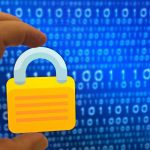This year has seen several notable cybersecurity crises play out on a global scale, from compromised email servers to allegations of hacking at the top level of politics and the notorious Wannacry ransomware attack that crippled computers on every continent. As companies, governments and security specialists scramble to face a cyber threat that has never been bigger, several new trends are developing that will shape the future of online and data security. In this article, we take a look at five big trends in cybersecurity that you’ll want to watch in the coming months.
1. The Rise and Rise of a Global Cybersecurity Obsession
2016 was the year of innovation in the tech sector, with new technologies and enhanced cloud services being launched successfully. In a world where the number of internet users keeps growing and countries that hadn’t heard of the internet a few decades ago now almost fully connected, innovation is driving the future. Unfortunately, as the focus shifted away from security over the past year or so, cyber criminals saw their chance to strike.
Following the publicized Wannacry attack, which cost governments millions of dollars in lost productivity and even put lives at risk when hospital networks were affected, the entire world is taking cybersecurity extremely seriously. Law enforcement agencies are pairing up with software developers and internet service providers to track and apprehend the shadowy figures who control the so-called Dark Web, shutting down websites that deal in terrorism, illegal arms, drugs, and illicit pornography as they target their owners. This trend is set to intensify as authorities make it their mission to retake control of the internet from cyber criminals.
2. Secure Identity Verification on Multiple Platforms
In an age when fingerprint ID and retina recognition can be carried out by smartphones and affordable mobile devices, most of us still rely on traditional usernames and passwords to protect our most valuable information. The number of data security breaches involving passwords stolen by hackers is huge – and even without being hacked, some of us choose passwords that are so obvious that a five-year-old could guess them. A new system, known as identity management federation, may be just what we need to upgrade data security around the world.
By federating, or combining the different types of identity verification, this new type of online ID check eliminates some of the dangers associated with using only a password. Users may be required to enter a pin sent to their mobile device, while their smartphone or computer can also be used as a form of verification. Fingerprint scanning and other biometric technologies may also become much more common as online security is tightened further. Combining these security measures, and allowing users to securely access multiple services like email, websites, and apps after signing in once – but securely – could be the future of cybersecurity.
3. Accepting that Prevention is Sometimes Impossible
Cyber criminals have found ways to breach almost every type of security imaginable – and chances are, they’ll do it again in the future. While governments and corporations invest heavily in cybersecurity, their focus won’t just be on prevention, but also on how they respond to breaches and cyber attacks.
Preventing cyber crime is no different than preventing physical crimes – no matter how many preventative measures you take, there’s still a chance that crime will occur. By focusing solely on preventative measures, we run the risk of being like a community that has hundreds of CCTV cameras, but not a single police officer to respond to a crime in progress. Tracking cyber criminals, understanding how they operate, and lifting the veil of anonymity that they use to protect their real identities (and evade the law) is the new focus of cybersecurity professionals.
4. Turning to AI for Security Solutions
Artificial Intelligence is changing the way organizations are run on every continent, as smart software helps medical researchers find new cures, develops financial strategies on Wall Street and advises consumers on the best buying decisions. Unfortunately, AI is also likely to be employed by cyber criminals in their illicit activities – and a new generation of AI crime-busters is emerging to counter this threat.
AI systems can analyze huge amounts of data in a fraction of the time that it would take a human being – even a high-IQ genius. Lately, new advances in AI have seen computer systems taking smart decisions that are totally in line with human expert opinion – and often faster and better too. With the huge amount of data that the world is producing, security AI is set to explode, monitoring the internet for signs of cybercrime and helping authorities to prevent and react to it faster.
5. Keeping the Cloud Safe for Everyone
The sheer number of cloud computing users – well in the billions by 2017 – is enough to give cybersecurity experts a sleepless night or two. With so many users in the system, it’s becoming essential to know who they are and whether their activities are legitimate – without violating users’ privacy rights in the process.
As more companies return to the cloud after a period of nervousness about the safety of off-site data storage (and the realization that on-site storage just isn’t practical for their huge amounts of data), securing what’s up there and who’s using it will be the main focus of cloud security in the coming months and years. Companies may find themselves blacklisted for lax user identification procedures, while new cloud services with enhanced security features may be developed to serve governments and large corporations.
Conclusion
Cybersecurity has never been more important, and it’s never been more lucrative either. With more cybersecurity jobs available than there are applicants in many markets, keeping the world’s data secure has become a lucrative career choice. The near term will see large organizations, still reeling from ransomware and hacking attacks, ramp up their security efforts enormously – as the general public comes to realize just how vulnerable we all are to fresh cyber attacks. By keeping an eye on the trends we’ve covered today and the new ones that are set to emerge, you’ll be able to stay up to date with this vital and ever-changing industry.















